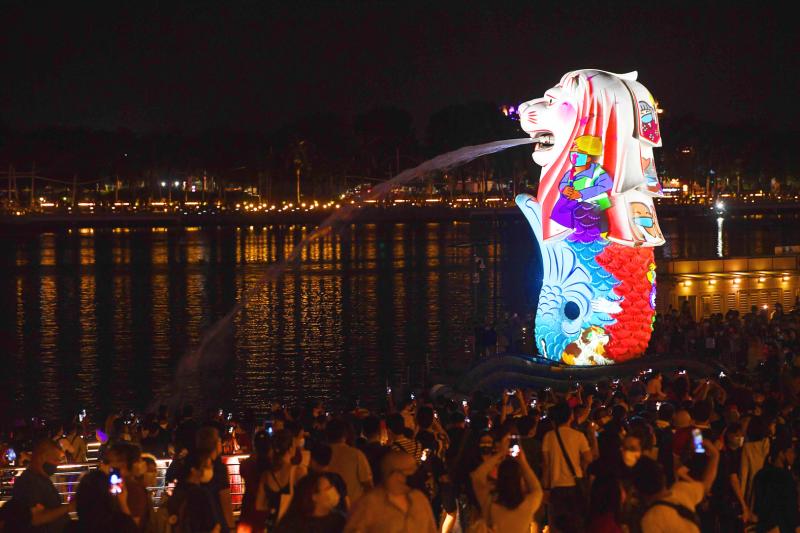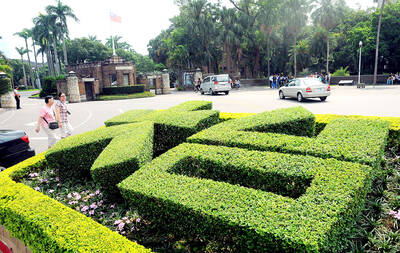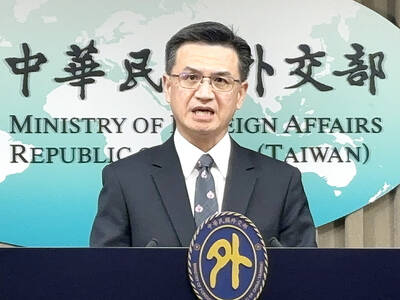New Year’s Eve yesterday was being celebrated like no other, with COVID-19 pandemic restrictions limiting crowds and many people bidding farewell to a year they would prefer to forget.
Australia was among the first nations to ring in the new year.
It was a grim end to the year for New South Wales and Victoria, the nation’s two most populous states, which were battling to curb new COVID-19 outbreaks.

Photo: AFP
In past years, 1 million people crowded Sydney Harbour to watch fireworks that center on the famous bridge, but most were watching on TV as authorities urged residents to stay home.
Locations on the harbor were fenced off, popular parks closed and famous night spots eerily deserted.
A 9pm fireworks display was scrapped, but there was a seven-minute pyrotechnics show at midnight.
People were only allowed in downtown Sydney if they had a restaurant reservation or were one of five guests of an inner-city resident. Some harborside restaurants were charging up to A$1,690 (US$1,305) for a seat, Sydney’s Daily Telegraph reported on Wednesday.
New Zealand, two hours ahead of Sydney, and several of its South Pacific island neighbors have no COVID-19 cases and New Year celebrations were the same as ever.
Beijing was holding a countdown ceremony with just a few invited guests, while other planned events were canceled.
Temperatures plunging to minus-15°C also discouraged people from spending the night out with friends.
Hong Kong, with its British colonial history and large expatriate population, usually hosts raucous celebrations along the waterfront and in bar districts, but for the second consecutive year, New Year’s Eve fireworks were canceled, this time due to COVID-19 rather than public security concerns.
Hong Kong social distancing regulations restrict gatherings to only two people and restaurants had to close by 6pm.
Much of Japan also welcomed the new year quietly at home, alarmed after Tokyo reported a record number of daily COVID-19 cases. It was the first time that daily cases in the capital topped 1,000.
Tokyo Governor Yuriko Koike asked people to skip countdown ceremonies and expressed concern about crowds of shoppers.
“The coronavirus knows no year-end or New Year’s holidays,” she told reporters.
Many people skipped what customarily has been a chance to return to ancestral homes for the holidays, hoping to lessen health risks for extended families.
Business at rural restaurants dropped, while home deliveries of traditional New Year’s “good luck” food — osechi — boomed.
Japanese Emperor Naruhito delivered a video message for the new year, instead of waving from a balcony with the imperial family as cheering crowds throng outside the palace.
Train services that usually carry people on shrine visits overnight, as well as some countdown ceremonies, were canceled.
The Meiji Shrine in downtown Tokyo, which normally attracts millions of people during the holidays and is usually open all night on New Year’s Eve, closed at 4pm.
In South Korea, the Seoul City Government canceled its annual New Year’s Eve bell-ringing ceremony in the Jongno neighborhood for the first time since the event was first held in 1953, months after the end of the Korean War.
The ceremony, in which citizens ring a large bell in a traditional pavilion when the clock strikes midnight, normally draws an estimated 100,000 people and is broadcast live.
Authorities in eastern coastal areas closed beaches and other spots where hundreds of thousands of people typically gather on New Year’s Day to watch the sunrise.
The southeastern city of Pohang instead planned to broadcast the sunrise at several beaches live on its YouTube channel.

Taiwan has experienced its most significant improvement in the QS World University Rankings by Subject, data provided on Sunday by international higher education analyst Quacquarelli Symonds (QS) showed. Compared with last year’s edition of the rankings, which measure academic excellence and influence, Taiwanese universities made great improvements in the H Index metric, which evaluates research productivity and its impact, with a notable 30 percent increase overall, QS said. Taiwanese universities also made notable progress in the Citations per Paper metric, which measures the impact of research, achieving a 13 percent increase. Taiwanese universities gained 10 percent in Academic Reputation, but declined 18 percent

Chinese President Xi Jinping (習近平) yesterday met with former president Ma Ying-jeou (馬英九) at the Great Hall of the People in Beijing, with Xi’s opening statement once more emphasizing that people on both sides of the Taiwan Strait are Chinese and that foreign intervention cannot change their inevitable unification. Xi said that 5,000 years of history of zhonghua minzu (中華民族, ethnic Chinese group) have seen their ancestors move to Taiwan to establish new lives, while also documenting them fighting side-by-side against foreign forces and finally freeing Taiwan. “Both sides are Chinese,” and there are no issues that cannot be worked through, he

BULLY TACTICS: Beijing has continued its incursions into Taiwan’s airspace even as Xi Jinping talked about Taiwan being part of the Chinese family and nation China should stop its coercion of Taiwan and respect mainstream public opinion in Taiwan about sovereignty if its expression of goodwill is genuine, the Ministry of Foreign Affairs (MOFA) said yesterday. Ministry spokesman Jeff Liu (劉永健) made the comment in response to media queries about a meeting between former president Ma Ying-jeou (馬英九) and Chinese President Xi Jinping (習近平) the previous day. Ma voiced support for the so-called “1992 consensus,” while Xi said that although the two sides of the Taiwan Strait have “different systems,” this does not change the fact that they are “part of the same country,” and that “external

UNDER DISCUSSION: The combatant command would integrate fast attack boat and anti-ship missile groups to defend waters closest to the coastline, a source said The military could establish a new combatant command as early as 2026, which would be tasked with defending Taiwan’s territorial waters 24 nautical miles (44.4km) from the nation’s coastline, a source familiar with the matter said yesterday. The new command, which would fall under the Naval Command Headquarters, would be led by a vice admiral and integrate existing fast attack boat and anti-ship missile groups, along with the Naval Maritime Surveillance and Reconnaissance Command, said the source, who asked to remain anonymous. It could be launched by 2026, but details are being discussed and no final timetable has been announced, the source